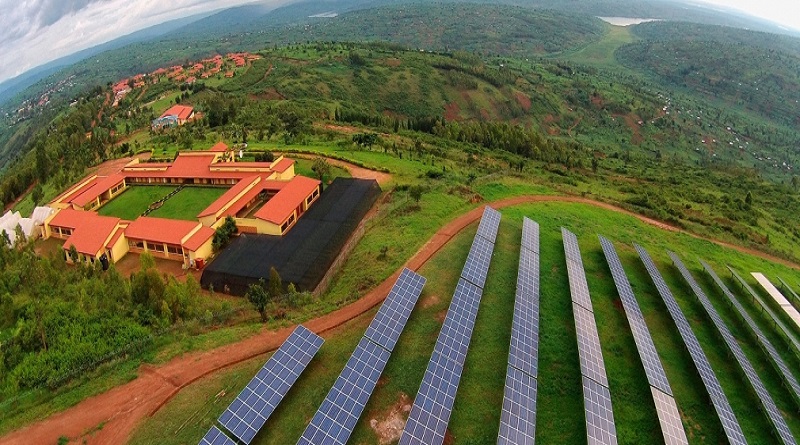How climate action can drive sustainable development in Africa
Representatives of governments, business and civil society have said that action on climate change in form of green policy, finance and market approaches can drive sustainable development in Africa.
This was disclosed on Tuesday at the opening of the ongoing Africa Carbon Forum taking place in Kigali, Rwanda even as they stressed that investment in climate change can advance Sustainable Developments Goals of Agenda 2030,
“Just as the risks of climate change are immense, so too are the rewards of climate action if we invest in our people and our planet,†said Vincent Biruta, Rwanda’s Minister of Natural Resources.
In December 2015 in Paris, countries adopted a new comprehensive climate change agreement, central to which is nationally determined action and international cooperation. Driving it all will be private and public investment.
World Bank analysis has estimated that not addressing climate change could plunge 100 million more people into poverty by 2030. Of those 43 million would be in Africa.
“Turning challenges into opportunities requires concrete action, collaboration and commitment,†said Mr. Biruta. “I am sure we are up to the task.â€
Africa Carbon Forum is an annual gathering aimed at spurring climate investment, through sharing information on policy, such as use of markets and mechanisms, financial opportunities, and cooperative initiatives arising from the international response to climate change.
What the organizers of Africa Carbon Forum 2016 are saying: “Africa is going to play a critical role in the spread of markets under the Paris Agreement. Numerous regional governments are keen to leverage international markets to achieve their nationally-determined contributions, and support from both the private sector as well as policy leaders will be key to ensuring Africa can deliver on its targets. In the lead up to the Marrakech COP22 in November this year, the ACF2016 provides a strategic platform for these exchanges to take place.â€
Dirk Forrister, President and CEO International Emissions Trading Association, “Countries in Africa feel the dangers of climate change, but I’m confident they will also see the tremendous push that climate action can give to sustainable development. With the right climate policy choices, and by working together, countries can spur investment that benefits people and the atmosphere. In fact, action on climate is action for sustainable development.â€
Daniele Violetti, Chief of Staff, United Nations Framework Convention on Climate Change, “Trade can help African countries, individually and together, leverage the various co-benefits of climate policies. It can also help transfer innovations from market to market, within Africa and with the broader developing world. Without trade flexibility, the costs of climate change are projected to be higher, especially in some least developed and island developing countries that are most severely affected by climate change. It is thus important is to consider the large – and largely unexplored – role international trade can play as part of the solution.â€
Bonapas Onguglo,  OiC Trade and Environment Branch, United Nations Conference on Trade and Development, “The very first Africa Carbon Forum in the post-Paris era will pave the way for actions that put Africa’s green and sustainable development at centre stage. We are excited that this forum will provide the opportunity for a diverse audience of public and private sector stakeholders to meet and discuss how investments in climate actions can advance the Sustainable Development Goals of Agenda 2030. Once realized, an inclusive, low-carbon development pathway can have a truly transformational impact on the well-being of communities across the African continent.â€
Jo Scheuer, Director for Climate Change and Disaster Risk Reduction, Bureau for Policy and Programme Support, United Nations Development Programme, “The total funds needed in the region to tackle climate change is well over $3 trillion, as per the estimates African countries submitted in Paris last winter. This is a sizeable amount, but we’re committed to contributing our part, and already helping mobilize financial and technical support so African countries can move towards taking action on the ground. For example, our African Climate Business Plan aims to mobilize approximately USD19 billion as a contribution towards resilience.â€
James Close, Director for Climate Change, World Bank Group, “The African Development Bank is committed to ensuring that the climate change issue is a developmental issue. Access to energy is critical to meeting Africa’s climate mitigation commitments and its needs for sustainable development. It is therefore imperative that adequate long-term finance is made available. We need to massively scale up Africa’s access to finance.â€
Anthony Nyong, Division Manager, Environment and Social Protection, African Development Bank, “With the Paris agreement as the foundation, countries are now looking towards implementation. This will require accelerating existing initiatives and finding new solutions and building new partnerships, which can facilitate capacity-building and unlock new investments and finance for a climate resilient low-carbon development future for Africa. The opportunities for the Africa Region are indeed promising, and the Africa Carbon Forum presents itself as a much needed platform for sharing knowledge, experiences and new ideas which will benefit Africa and its people.â€



